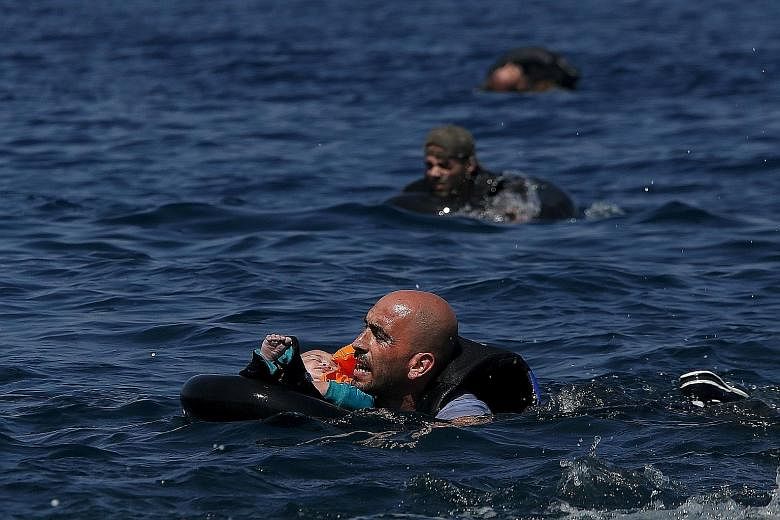VIENNA • Migrants sped through the Balkans by train, bus and taxi yesterday, racing to beat a border crackdown promised by Hungary's right-wing government, as European Union members discussed a draft agreement to distribute asylum seekers across the continent.
The two-decade-old era of border-free travel in Europe is unravelling as countries impose controls on their frontiers in response to an unprecedented influx of migrants.
Germany's surprise decision to restore border controls on Sunday had a swift domino effect, forcing neighbouring countries to shut their own frontiers as thousands of refugees pressed north and west across the continent.
Austria dispatched its military to guard its frontier with Hungary after thousands of migrants crossed the border on foot overnight, filling up temporary accommodation space in tents and railway station carparks.
"If Germany carries out border controls, Austria must put strengthened border controls in place," Vice-Chancellor Reinhold Mitterlehner told a joint news conference with Chancellor Werner Faymann.
He and Mr Faymann said the military would be deployed in a supporting role.
"The focus of the support is on humanitarian help," Mr Faymann told reporters at the conference. "But it is also, and I would like to emphasise this, on supporting border controls where they are necessary."
Slovakia said that it, too, would shut its own borders with Austria and Hungary.
The measures represent the biggest threat to the Schengen system, which since 1995 has eliminated frontier posts across Europe and ranks alongside the euro single currency as one of the transformative achievements of integration upon the continent.
The 26 European countries in the Schengen area issue common visas and leave the borders between them unguarded.
Frontiers which were fought over for centuries and which choked off traffic and trade just a few years ago, are now marked by little more than signposts on highways across the world's biggest economic bloc.
But the rules still bar undocumented migrants from travel within the zone, while leaving few mechanisms to stop them.
That has created chaos as hundreds of thousands of people, including refugees from war in the Middle East, arrive on the bloc's southern and eastern edges and head to richer and more welcoming countries further north and west to seek asylum.
European interior ministers yesterday held crisis talks, with Germany, France and the bloc's executive commission trying to overcome opposition from eastern members to a plan to relocate 160,000 refugees from Italy, Hungary and Greece.
Poland said that it was prepared to impose controls if migrants headed towards its frontier in large numbers, and that any EU decision to impose quotas for accepting refugees on member states without their agreement would lead to institutional crisis.
"We will accept only as many refugees as we can afford, not a single one more or less," said Prime Minister Ewa Kopacz.
A draft agreement would also include strong language on the need for tighter controls of the bloc's external borders, rapid screening of arrivals and deportation of those without valid asylum claims, to help assuage countries concerned that relocating asylum seekers could attract more people.
Most of the refugees have been bound for Germany, which announced last month it would suspend the EU asylum policy to accept Syrians who arrive elsewhere in the EU, creating greater incentive for migrants to trek across the bloc.
German Chancellor Angela Merkel has taken a lead on the issue, announcing that Europe's richest country was able and willing to host hundreds of thousands of migrants and was preparing for as many 800,000 asylum applications this year.
Her vice-chancellor said in a letter to party members that this figure could rise to one million.
Yesterday, British Prime Minister David Cameron visited Syrian refugees in Lebanon, where his counterpart Tammam Salam said the Middle East country is hosting as many as 1.5 million refugees. The United Nations refugee agency puts the figure at around 1.1 million.
Britain has promised £100 million (S$218 million) to help Syrian refugees in several countries, with up to £29 million going to Lebanon.
REUTERS, AGENCE FRANCE-PRESSE

